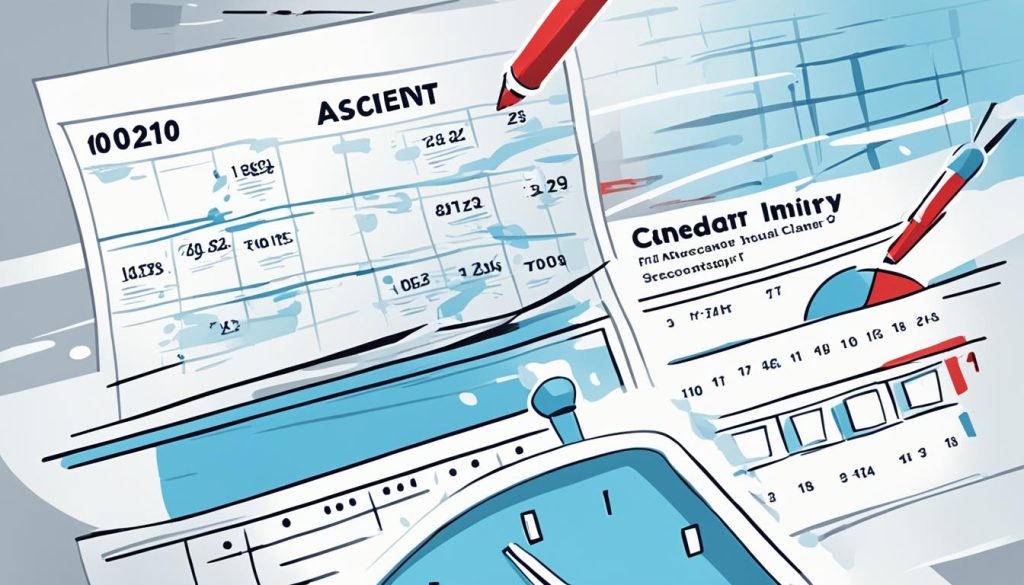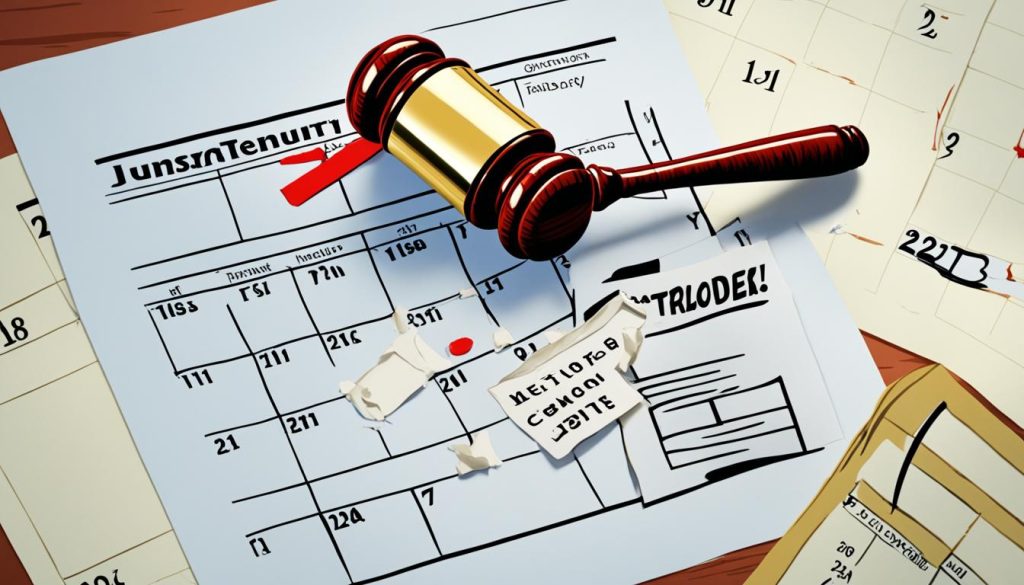If you’ve been hurt because of someone else’s mistake, you might wonder about the deadline for filing a personal1 injury claim. In most states, like Virginia, you have two years from when the accident happened to file a claim1. This rule covers many types of injuries, such as car crashes, slipping and falling, being attacked, and medical mistakes.
Knowing the deadline in your state is crucial. The courts are strict about these deadlines. If you miss the deadline, you won’t be able to claim compensation for your injuries and losses2.
Key Takeaways
- In Virginia, the deadline to file a personal injury claim is usually 2 years after the accident.
- This deadline is strictly followed, so make sure you file on time.
- Missing the deadline means your case could be thrown out, leaving you without compensation.
- Talking to a skilled personal injury lawyer can help you understand the legal details and meet deadlines.
- Starting legal action quickly can strengthen your case and protect your rights.
Understanding Statutes of Limitations in Personal Injury Cases
In the U.S., knowing about statutes of limitations is key for personal injury claims. These laws set a time limit for filing a lawsuit after an injury3. They make sure claims are made on time, stopping old or fake cases that could be hard to prove later.
What is a Statute of Limitations?
A statute of limitations is a law that sets a time frame for filing a personal injury lawsuit4. If you don’t file within this time, the court will likely drop your case, even if your claim is strong. These laws push people to act quickly and keep evidence and witness stories fresh.
Reasons for Statutes of Limitations
Statutes of limitations have several key roles. They stop old claims that can’t be properly looked into because evidence is gone or memories are unclear5. They also make people act fast on their claims instead of waiting forever. And, they protect defendants from facing claims that are hard to defend against because they’re too old.
It’s vital to understand statutes of limitations if you’re thinking about filing a personal injury claim. Knowing the time limits helps you protect your rights and make sure you don’t miss out on your case345.
The Statute of Limitations for Personal Injury Claims in Virginia
If you’ve been injured in Virginia because of someone else’s mistake, you need to know about the state’s rules for personal injury claims6. You have two years to file a claim6. But, some situations can change this deadline, making it different for everyone6.
Virginia says you must start a lawsuit within two years after your injury6. This gives you a set time to either sue or settle your case6. There’s a special rule that can pause the clock if you didn’t know about the injury right away6. You’ll need to prove you couldn’t have known about the injury earlier6.
Some cases, like leaving a foreign object in you during surgery, might use this rule6. It’s smart to talk to a lawyer in Virginia to understand your rights and get compensation for your injury6. A lawyer can also help you deal with insurance companies and make sure you get fair payment6.
Virginia also has different rules for other injury cases7. For example, you have five years to file a claim for property damage or medical costs for an injured baby7. If you were hurt by a doctor, you might have more time if certain conditions apply7.
For cases of childhood sexual abuse, you have 20 years to act7. Adults have 10 years to file a claim for sexual abuse7. If someone in a position of power hurt you, you have 15 years to file a claim7. Claims for car accident damage have a five-year limit7.
Virginia uses the contributory negligence rule, which means you can’t get damages if you’re even a little bit to blame8. There are limits on what you can get in some cases against doctors8.
Knowing the rules for personal injury claims in Virginia is key to protecting your rights and getting fair compensation6. Talking to a skilled lawyer can help you file your claim on time and navigate the legal process678.
Exceptions and Tolling Provisions
In Virginia, there are certain situations where the time limit for filing a personal injury claim can be paused9. This pause, known as tolling, can extend the usual 2-year deadline9.
Circumstances That May Toll the Statute of Limitations
If the injured person is a minor, has a disability, or can’t make decisions, the deadline might be extended9. Also, if the injury was hidden by fraud, or the claim was dropped and then refilled, the clock stops9.
But, Virginia courts usually don’t extend the 2-year time limit for personal injury claims9. It’s crucial for claimants to file on time to keep their legal rights9.

“The statute of limitations is designed to ensure fairness and encourage the timely filing of claims. Exceptions are limited to protect the integrity of the legal system.”
It’s vital for those hurt to know about the special rules and exceptions that might apply to them9. Talking to a skilled personal injury lawyer can help make sure you follow the rules and increase your chances of winning9.
personal injury claim, filing deadline, statute of limitations
Understanding legal timelines and deadlines is key when dealing with personal injury claims in Virginia. The state has a two-year statute of limitations for filing a personal injury lawsuit10. You must start your civil action within this time frame, even if you’re still negotiating with insurance companies11.
The deadline in Virginia is for filing the claim, not settling the case10. Personal injury cases can take over two years to resolve because of complex medical issues or other factors10. It’s vital to file your claim on time to keep your legal rights and get compensation for your injuries.
- Claims for assault, battery, or negligence in Virginia must be filed within two years of the incident10.
- Claims for property damage or repair costs, including car damage, have a three-year deadline10.
- Medical malpractice claims must be filed within one year of discovering the negligence10.
If you don’t file your claim on time, your case could be dismissed11. It’s important to get legal advice quickly after an injury. This ensures you meet deadlines and look into any exceptions or extensions for your situation11.

Knowing about the personal injury claim process, including deadlines and statute of limitations, helps you protect your rights. It also increases your chances of getting the compensation you deserve101112.
The Importance of Filing Within the Deadline
The statute of limitations is key in personal injury claims13. It sets a deadline for filing a lawsuit, starting from when the injury happened13. If you miss this deadline, your case could be dismissed, and you’ll lose your chance to get compensation.
Consequences of Missing the Statute of Limitations
Trying to file a lawsuit after the deadline means your claim will likely be thrown out13. Courts take these deadlines seriously and won’t let claims go forward late13. Missing the deadline means you can’t sue and won’t get compensation for your injuries13.
The time you have to file a claim varies by state, from six years to just two or three14. Some cases might extend this time, but these are rare13. It’s important to know the deadline and work with a lawyer to file on time14.
Following the statute of limitations is crucial for winning personal injury cases15. Filing quickly and getting legal advice early helps avoid missing the deadline15.
In summary, the statute of limitations for personal injury claims is strict13. Missing it can lead to your case being dismissed and losing your right to compensation13. Working with a lawyer is key to understanding your deadline and filing on time151314.
Special Rules for Claims Against Government Entities
If you’re filing a personal injury claim against a government in Virginia, you need to know the special rules and deadlines16. The time you have to sue is only six months, unlike the usual two years for private cases16. You must file your claim within six months after getting hurt16.
After your claim is rejected, you have six months to start a lawsuit16. If the government doesn’t act on your claim in 45 days, it’s seen as rejected, letting you sue 45 days after you filed16.
You might be able to file a late claim if you miss the six-month deadline16. This late claim must be filed within a year of your injury16. Reasons for a late claim include mistakes, surprises, or being unable to act due to illness or death16.
If your late claim is denied, you have six months to ask the court for an exception16. Your request must include your details and the facts of your injury16. You can appeal if the court says no16.
Working with a lawyer in Virginia can help you follow these rules and deadlines17. Missing the deadline can stop you from suing a government entity17.
| Statute of Limitations | Filing Deadline | Exceptions |
|---|---|---|
| 6 months for claims against government entities16 | Claim must be presented within 6 months of injury16 Lawsuit must be filed within 6 months of claim rejection16 |
Late claim application can be filed within 1 year of injury16 Petition to court for relief from 6-month deadline must be filed within 6 months of claim rejection16 |
Remember, claims against government entities in Virginia have strict deadlines and rules17. Talking to a skilled personal injury lawyer can help you meet all the requirements and protect your rights18.

Conclusion
Understanding the personal injury claim process and the statute of limitations is key to protecting your right to damages. In California, most personal injury cases have a two-year deadline from when the injury happened19. But, there are exceptions for cases against government entities or certain situations1920.
It’s smart to talk to a skilled personal injury lawyer, like those at B|B Law Group. They can help make sure your claim is filed on time and explain your legal options19. Acting quickly and getting legal help boosts your chances of a successful claim. This way, you can get the compensation you need for your injuries and losses20.
The statute of limitations is very important in personal injury cases. If you miss the deadline, you could lose your chance to get compensation1920. So, take steps to protect your rights. Work with a qualified lawyer to go through the claim process well and effectively.
FAQ
How long do you have to file a personal injury claim in Virginia?
You have 2 years to file a personal injury claim in Virginia. This is stated in Virginia Code § 8.01-243(A). You must file a lawsuit within 2 years after the accident or incident to claim compensation for injuries caused by someone else’s negligence.
What is a Statute of Limitations?
A statute of limitations is a deadline to file a lawsuit in Virginia. If you file after this deadline, the court will dismiss your claim. You won’t be able to pursue your claim in court even if it’s valid.
Why do Statutes of Limitations exist?
Statutes of limitations have been in place for centuries. They ensure claims are made within a reasonable time. This prevents claims that are too old or false, as evidence may be lost over time.
Are there any exceptions to the 2-year Statute of Limitations for personal injury claims in Virginia?
Yes, there are exceptions. Virginia can pause the 2-year limit under certain conditions. This includes if you’re a minor, have a disability, or the defendant committed fraud. The limit can also be paused if you’re not of sound mind or if the action was nonsuited.
Do I need to have my personal injury case heard or settled within the 2-year deadline?
No, you only need to file a civil action before the deadline. You don’t have to have your case resolved by a judge or jury before the 2-year limit. Just make sure you file your claim within the 2-year time frame set by Virginia law.
What happens if I miss the 2-year Statute of Limitations for a personal injury claim in Virginia?
If you file a lawsuit after the 2-year limit, the court will dismiss your claim. The court takes these deadlines seriously. Missing the deadline means you can’t pursue your claim in court and won’t get compensation for your injuries.
Are there any special rules for filing personal injury claims against government entities in Virginia?
Yes, there are special rules for claims against government entities in Virginia. You have 6 months to file a claim against a municipality or county. For claims against the State of Virginia, you have one year to file a notice of claim with the State Director or Attorney General. After filing your notice, you can sue within 2 years of your injury.
Source Links
- Ohio Personal Injury Statute of Limitations | How Long Do You Have to File? | Kisling, Nestico & Redick
- Ohio Personal Injury Statute of Limitations » Learn More
- Understanding the Statute of Limitations and Your Personal Injury Case
- Metzger Wickersham
- What Is the Personal Injury Statute of Limitations in Pennsylvania?
- Virginia Statute of Limitations | Personal Injury Lawsuites
- § 8.01-243. Personal action for injury to person or property generally; extension in actions for malpractice against health care provider
- Virginia Personal Injury Laws and Statutes of Limitations
- Statute of Limitations – getting_started_selfhelp
- How Long do I have to File My Personal Injury Claim in California?
- Personal Injury Law in California: Statutes of Limitations
- Deadlines to sue someone | California Courts
- Time Limits on Personal Injury Cases
- Statute of Limitations for Personal Injury Claims: Understanding Deadlines for Filing a Lawsuit – Leaders in Law
- Filing deadline for a Personal Injury Claim? | Snyder & Wenner
- The Rule of Six when suing a California public or governmental entity
- Government tort claims
- C.A. Extends Time Limits To File Claims Against The Government
- What is the Statute of Limitations on Personal Injury in California?
- What are California’s Statute of Limitations for Personal Injury or Wrongful Death Cases? | Sepulveda Sanchez Accident Lawyers

